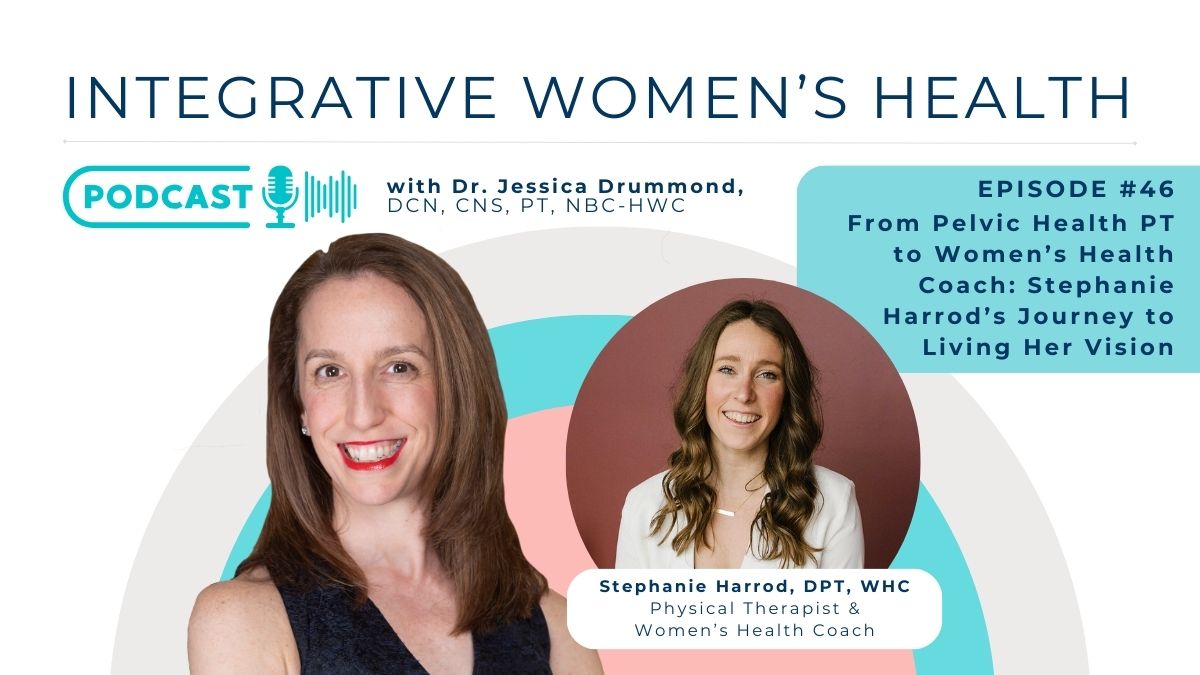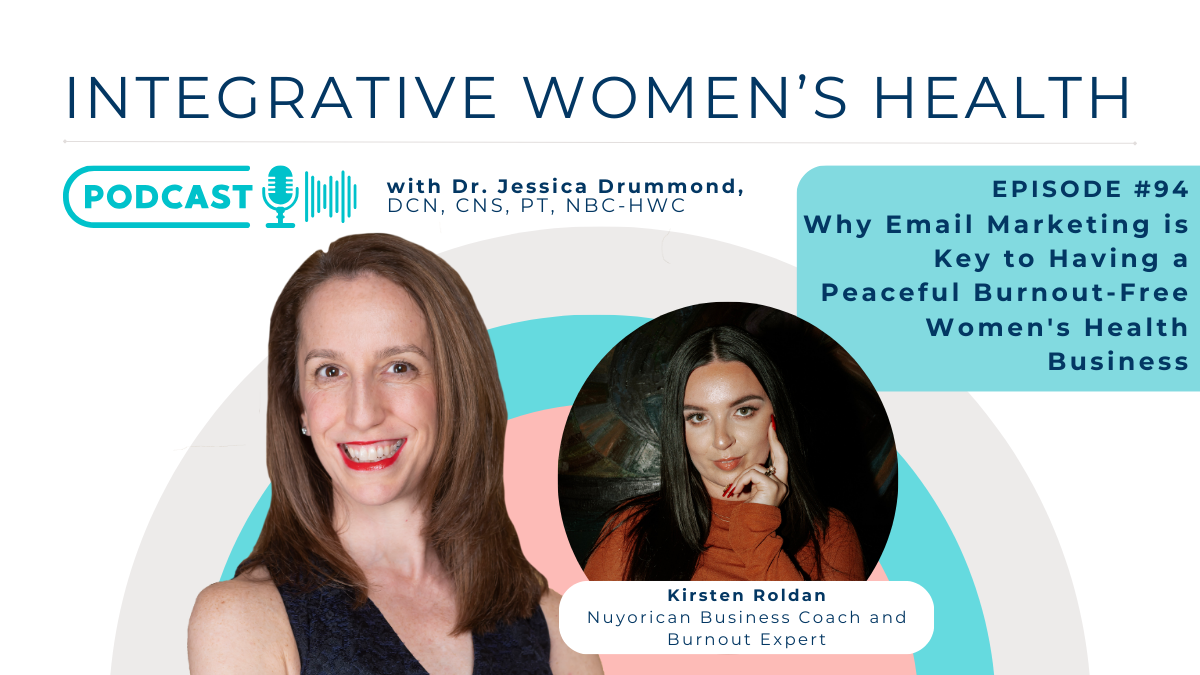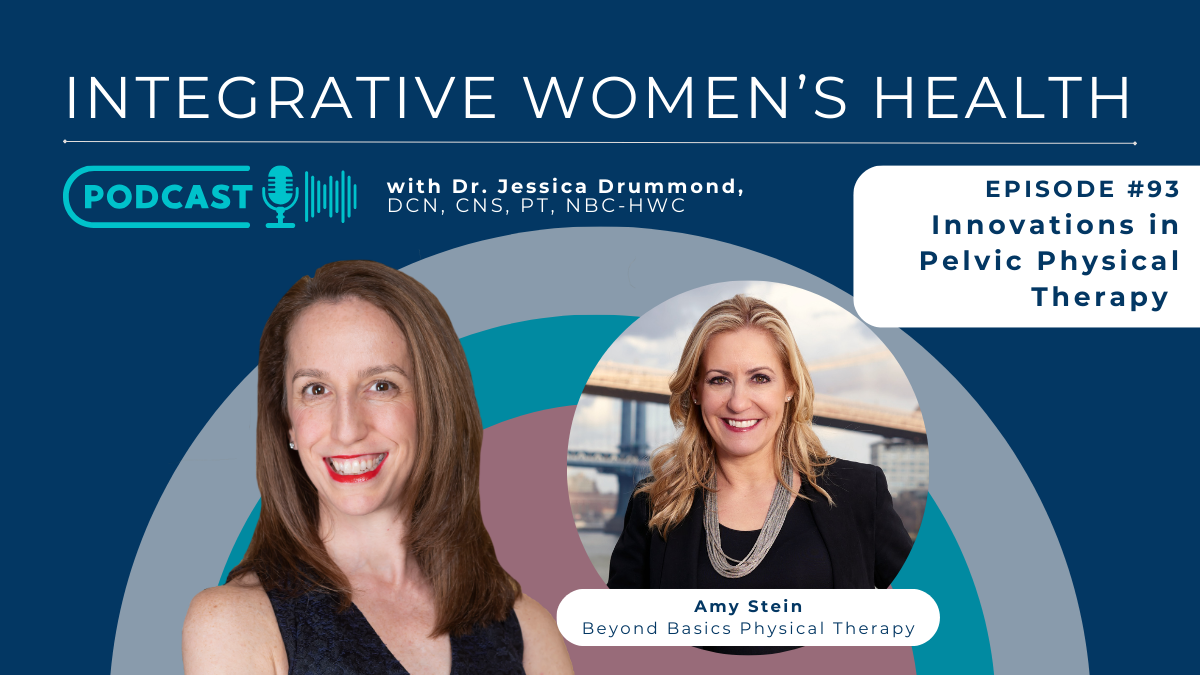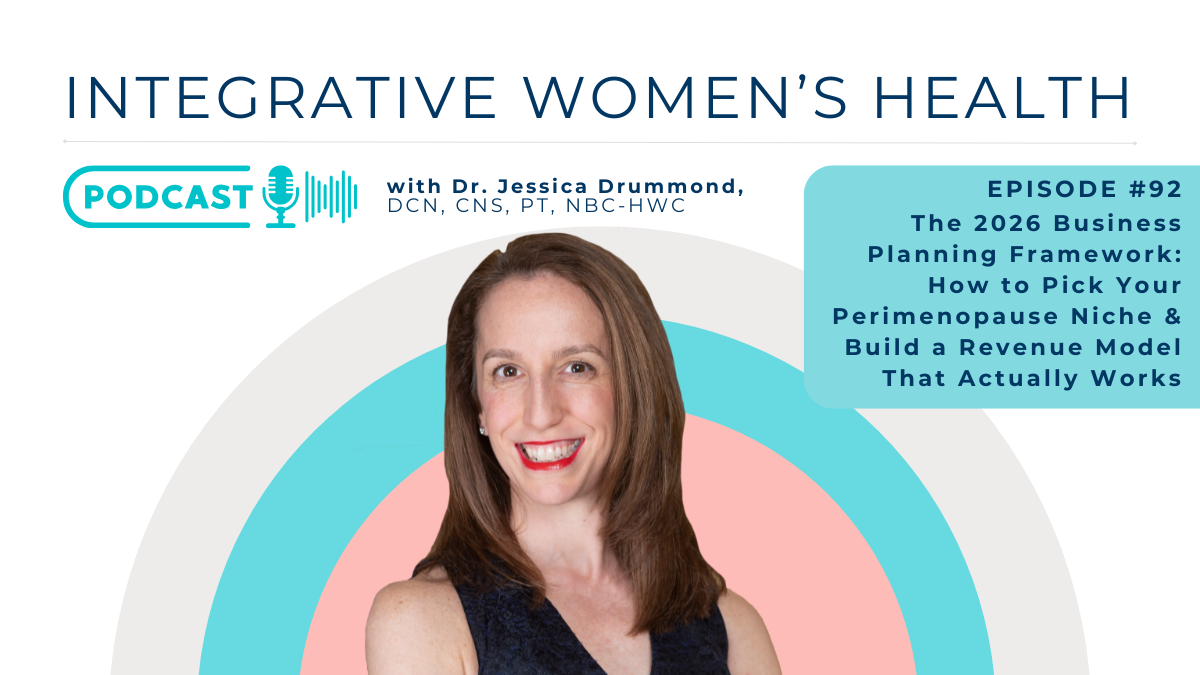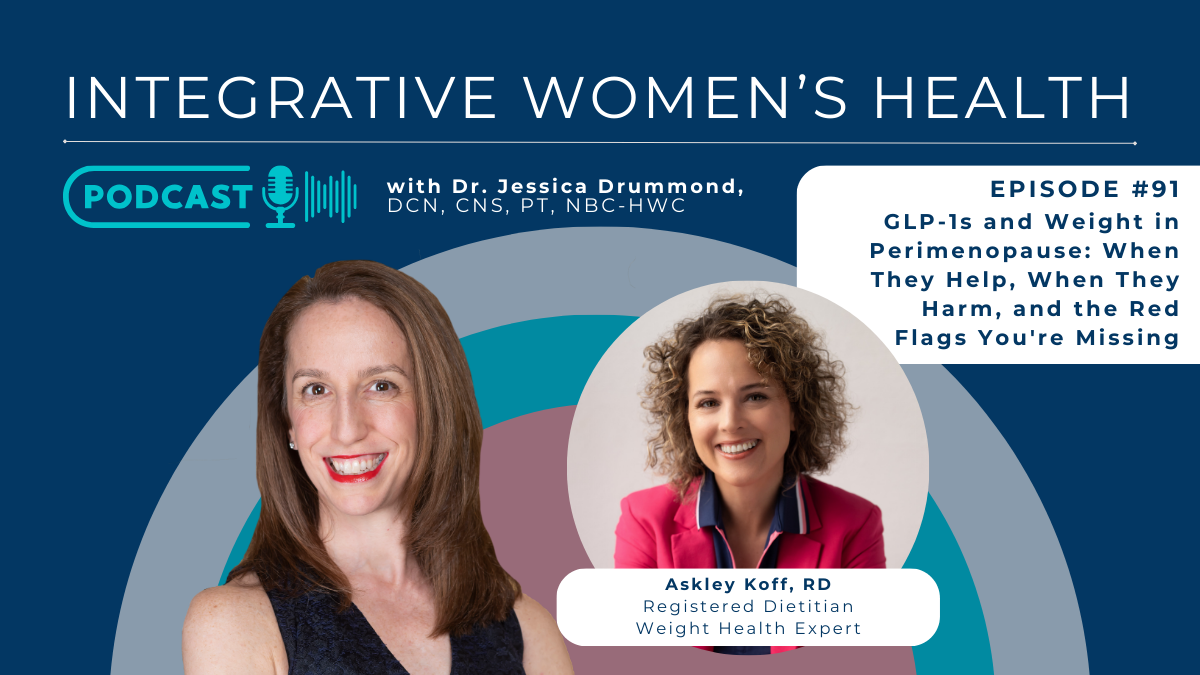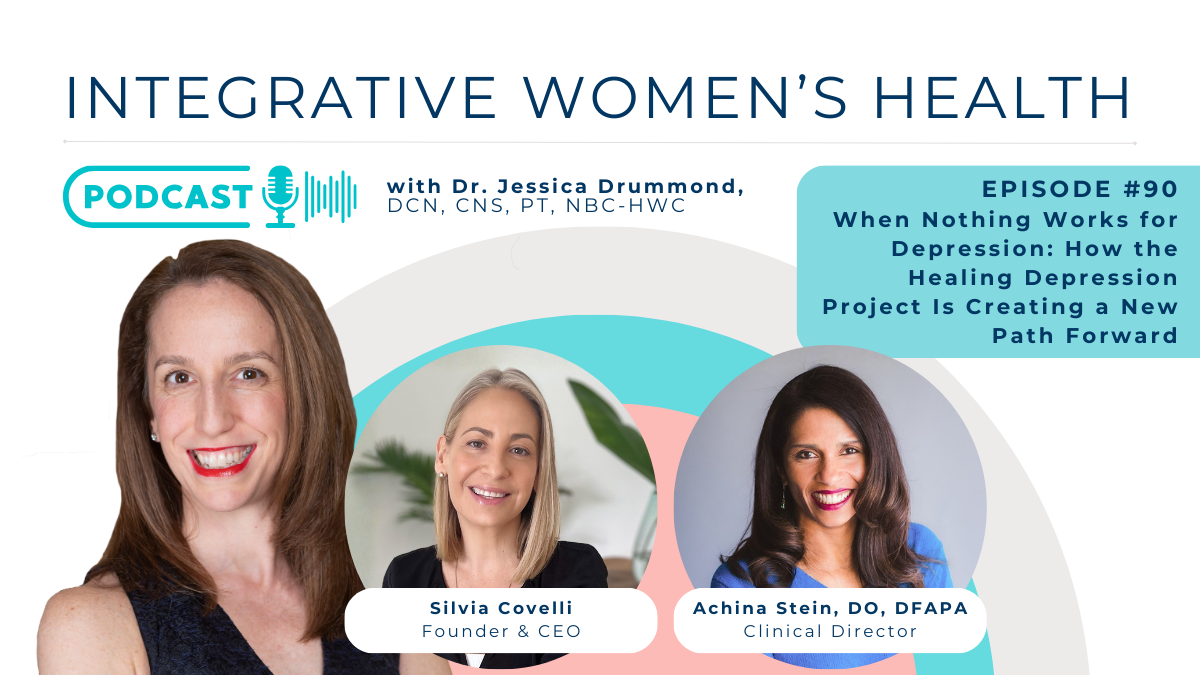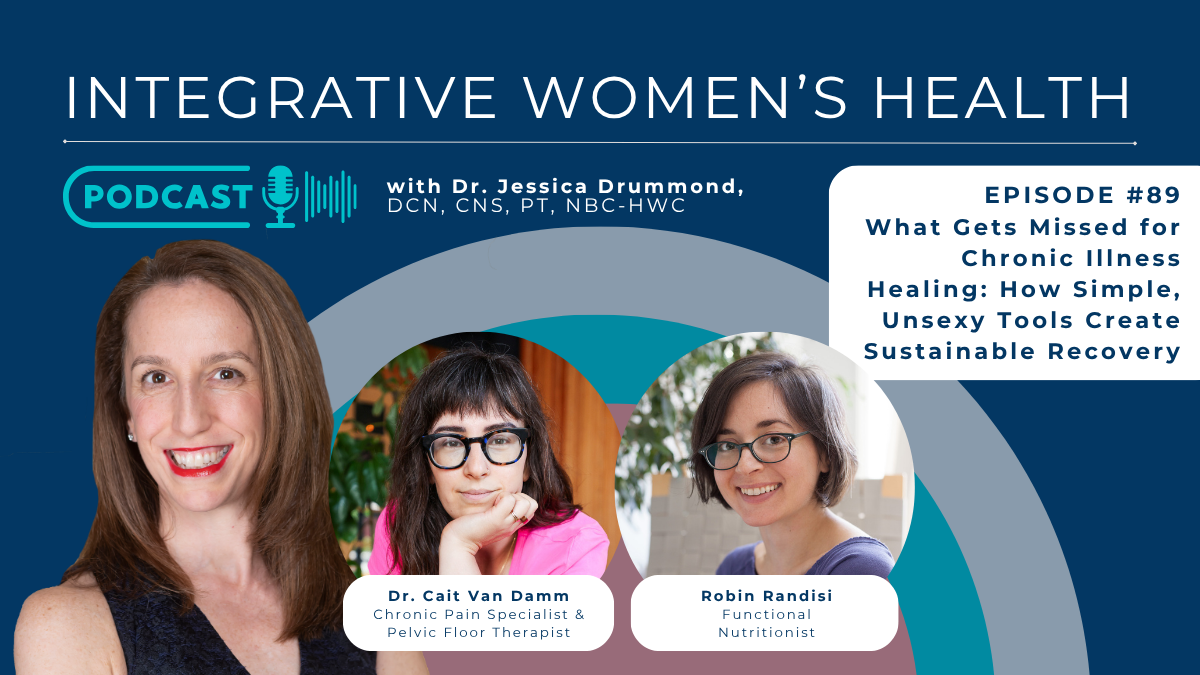Follow Us for Free:
About the episode
“I want my life to look different day-to-day and to solve different problems, and I want support and a way to do that sustainably.” – Stephanie Harrod
A big part of being a healthcare provider is helping people and servicing those who need our skills. This is reinforced when we train in a conventional healthcare field, where we’re taught to work in a service model that focuses on becoming a resource for our patients.
While service is a critical aspect of what we do, it’s essential to realize that your practice can also be something that serves you. When you refine your niche, the women you’re serving in your coaching practice can give you energy instead of draining you. Our jobs can nourish us, be in alignment, and propel us towards our goals.
Today, I’m joined by Stephanie Harrod, a graduate of the Women’s Health Coach certification program and a pelvic health physical therapist transitioning into her women’s health coaching practice. During the program, Stephanie created a very clear vision which she is now living. It’s an inspiring journey.
In this conversation, Stephanie and I talk about when she recognized the need for more tools and flexibility to serve her patients better, the challenges she faced in deciding whether to join the certification program, the value of community and mentorship, her advice for others considering similar career changes, the significance of vision in achieving professional fulfillment, and more.
Enjoy the episode, and let’s innovate and integrate together!
About Stephanie Harrod, PT, DPT, WHC
Stephanie Harrod is a doctor of physical therapy and certified Women’s Health Coach specializing in hormone and menstrual cycle health for female endurance athletes. Through one-on-one coaching, she partners with women to build support, resources, and strategies for healing to restore a sense of strength and resilience in their lives, work, and sports. She has over 10 years of education and experience in human physiology and women’s pelvic and hormonal health and has worked with hundreds of women through a holistic approach to healing. She lives in Spokane, Washington, with her dog Luci and husband Dane.
Highlights
- Stephanie’s career as a pelvic floor physical therapist
- Recognizing the need for more tools and resources to support patients
- Stephanie’s hesitation and ultimate decision to join our Women’s Health Coach certification program
- Developing a vision for the future of Stephanie’s career
- Defining and refining a niche for her practice
- The energy and joy that comes with serving your clients in the way you desire
- Why the mentorship and support aspects of the program were especially valuable for Stephanie
- The program’s unique focus on developing entrepreneurial skills and support from master coaches
- Words of wisdom for those considering a transition into women’s health coaching
- The importance of vision work in achieving personal and professional goals
- How to maintain long-term success after the initial momentum of starting a new practice
Connect with Stephanie Harrod, PT, DPT, WHC
- Stephanie Harrod’s Website | SynchronizedHealth.org
- Stephanie Harrod on Instagram @SynchronizedHealth
- Email Stephanie Harrod at info@synchronizedhealth.org
Ready to revolutionize your career and grow your practice?
- What is the next step in your career in women’s health and wellness? Start here: https://integrativewomenshealthinstitute.com/start-here/
- Integrative Women’s Health Institute on Instagram | @integrativewomenshealth
- Integrative Women’s Health Institute on YouTube
Learn more about The Integrative Women’s Health Institute’s Programs.
Click here for a full transcript of the episode.
Dr. Jessica Drummond 00:00:03 Hi and welcome to the Integrative Women’s Health Podcast. I’m your host, Doctor Jessica Drummond, and I am so thrilled to have you here as we dive into today’s episode. As always, innovating and integrating in the world of women’s health. And just as a reminder, the content in this podcast episode is no substitute for medical advice, diagnosis, or treatment from your medical or licensed health care team. While myself and many of my guests are licensed healthcare professionals, we are not your licensed healthcare professionals, so you want to get advice on your unique circumstances. Diagnostic recommendations treatment recommendations from your home medical team. Enjoy the episode. Let’s innovate and integrate together. Hi. Welcome back to the Integrative Women’s Health Podcast. I’m Doctor Jessica Drummond, your host. And today you’re going to get to meet Stephanie Herridge. She is a pelvic health physical therapist who is transitioning into being a women’s health coach. And she okay, this is what I want you to listen for in this interview. She created a very clear vision, which we refine together in our coaching calls over a few weeks.
Dr. Jessica Drummond 00:01:35 And now she is literally living that vision. So get ready to be inspired. let’s dive into my conversation with Stephanie Herrod. Hi and welcome, Stephanie. I’m so excited to be talking to you today because I’m really interested in your journey as a women’s health coach. So tell me, before you transitioned into the women’s health coaching program, what were you doing? What was your career like and what was missing that made you seek this out?
Stephanie Harrod 00:02:15 Yeah, definitely. Well, first of all, thank you for having me. I’m so excited to chat with you. And yeah, so I am I’m a physical therapist, a pelvic floor physical therapist, and I live in Spokane, Washington, and I work for an outpatient private practice that specializes in women’s health. So we see mostly pelvic floor, pregnancy, postpartum pelvic pain, but also have a breast cancer oncology, niche as well. so yeah. So that is what I’m still doing now. And, I graduated in 2019. So when Covid hit, I was less than a year out of school, and all of a sudden was kind of by myself.
Stephanie Harrod 00:03:03 Our resources at the clinic became really sparse and scattered, you know, understandably so. But I was, very still early on in my career and treating a lot of complex chronic pain, pelvic pain patients essentially by myself. and so I yeah, I really felt like I needed more tools and resources. So I was, you know, digging into a lot of the research and, trying to understand endometriosis better, PCOS, better, and all of that. And so, so, yeah, so that was kind of early just getting my feet wet and women’s health, and understanding that patient population. And as I started to practice more and more what I noticed and, you know, took courses and read more is that I was spending a lot of time Doing what now I know is coaching and, you know, sessions. I wouldn’t even get out of a chair. Like with a patient, we’d be like, okay, who else do we need on your team? Who else? You know, who are the urologists in town? Who have you seen? Who else do we need to bring in? you know, talking about lifestyle, stuff, you know, sleep and stress management.
Stephanie Harrod 00:04:20 And, so I was doing a lot of that, and I really liked it. and I really enjoyed it. but I just, I felt like I needed more tools and resources, and I had this kind of feeling in the back of my head of, like, I don’t feel like I’m doing my job as well as I could as a PT because I’m spending so much of my time doing this other stuff that is really important and almost necessary in order to move forward, with the patient. But, yeah, I was just feeling really split.
Dr. Jessica Drummond 00:04:51 Yeah. And I think that happens a lot with people who transition From a more clinical. Area of health care. And then they’re like, okay, I know I want to be a coach. I have some inkling about what coaching is because that’s starting to penetrate into the lexicon more than it was, you know, ten years ago. I know that listening to their concerns, going deeper, integrating relationships, knowing the patient’s goal, keeping the patient’s goals at the forefront, you know, bringing in full, comprehensive teams is part of what coaching is.
Dr. Jessica Drummond 00:05:26 And then so you were like, okay, I need to understand this better because I know I really like it. So when you got into the program, first of all, did you have any hesitations about joining the program? Or you’re just like, you know what, I’m really interested in this. I’m all in. Or were there like, well, let me think about it.
Stephanie Harrod 00:05:46 Absolutely. I mean, I, I’m obviously the program and your name came up a lot and, and I’m researching endometriosis, but the financial aspect was a huge part, because I had spent so much money on PT school and have so much debt from that, so it was really a two to probably three year process of thinking about it, wanting to join the program, not being sure, feeling this like guilty, like I already spent so much money. but like knowing that I needed more skills and tools and resources. So yeah, it was it was definitely a big decision. and a big, like, leap of faith and kind of making sure that that was the right move.
Stephanie Harrod 00:06:32 But yeah, I, I ended up taking the admissions call, on like a honeymoon in France. That was very belated. It was supposed to be in 2020 and it was in 2022. but took this call there and was like, okay, like, this is something my husband and I had been talking about was like having a more flexibility, being able to take calls from different places. So it was almost serendipitous that I was like, okay, this feels so right to be able to like, have, some more flexibility with my work and still still do the work that I love.
Dr. Jessica Drummond 00:07:06 Yeah, that’s.
Stephanie Harrod 00:07:06 Really kind of the turning point.
Dr. Jessica Drummond 00:07:08 Yeah. And I think that’s the inspiration for so many people because, you know, the work itself is really interesting. And there’s this aspect of many of our students and graduates want to transition from clinical healthcare to coaching because of the flexibility of time generally. And for you, it was also flexibility of location, which I love because even our company is global.
Dr. Jessica Drummond 00:07:34 We have people who work for us in France, in England. So what is your vision now that you know you’ve got these skills under your belt and you’re thinking about you and your husband maybe traveling, what does that maybe look like for you?
Stephanie Harrod 00:07:51 Yeah. Well, it’s, you know, my little coaching business is still so small, but it’s growing and gaining momentum, which is really exciting. so I’m able to start to kind of vision a little bit more about that. And yeah, ultimately our goal is to, potentially live abroad for a time before we have kids and, yeah, just experience and immerse ourselves in a different culture and, you know, get that experience. so yeah, I’m really excited to see where this can take, take me and just be able to have more time to be close and be with family and be with him and experience the world, but also still do really intentional, really, fulfilling work. So yeah, potentially a move, I don’t know, potentially an overseas move.
Dr. Jessica Drummond 00:08:43 So that’s exciting. That’s really cool. And so tell me more about your current coaching practice. So you just starting. It’s brand new No, but what are you focused on? What kind of work? And did you take a little time and think about how you wanted to build your coaching practice? Since we talk a lot in the program about how the practice should be in service of your clients, but also in service of your goals beyond that location and dependence.
Stephanie Harrod 00:09:11 Yeah. absolutely. So I my, current practice, I am catering my services to women, active women in their 20s and 30s kind of recreational athletes and runners, endurance athletes in particular. and with, you know, hormonal dysregulation. So, it kind of blends a lot of my loves, which is hormonal health. And I have personal history in that. And then this background for five years in physical therapy was dealing with a lot of endometriosis and various stuff, but then also my love for running and being outdoors. And then, I really like that population of women too, because it’s, you know, so frustrating to feel limited by your body when you feel like you have this potential.
Stephanie Harrod 00:10:05 and, and when so much of your mental health and your friends and your social group are, are involved in your, in your sports and, so being able to support women doing that, was a big part of why I wanted to go into that niche. and I found in physical therapy, I really liked that population as well. So, yeah, I have, a few clients now, and, I’m working we’re working virtually, and I’m partnering with a couple of groups and, different things locally and kind of throughout the US. And, yeah, just working on kind of getting getting it up and running.
Dr. Jessica Drummond 00:10:46 That’s really good. And one of the things that sounds like you’ve done really successfully is get a very clear kind of micro niche, right. You’re working with women of a narrow age group, mostly runners and some other endurance athletes who are struggling with injuries related to pelvic health. And so it’s very easy to tell people what you do. You know, quickly, I would imagine you’re finding that in these communities of women runners that have their friends who are runners, it’s very easy for them to tell other people, oh, you should go see Stephanie because they know exactly what you do.
Dr. Jessica Drummond 00:11:23 Are you finding that?
Stephanie Harrod 00:11:25 Yeah, that is been yeah, that’s been a big thing. and that is something that I developed with you over, like the Monday coaching call. So I think I came to a couple of those and was like, you’re like more narrow, more narrow, like. So I was able to kind of develop that niche and take all of these things that I really love and are interested in, and blend them together. and so in a really nice way that feels really true to who I am. And then yes, it’s been I kind of launched my social media last fall, and it was just so exciting and inspiring to hear people reach out and be like, oh, you know, I have a friend who’s a runner and has had three miscarriages. I need to tell her about you. And oh, I have this, you know, I have a friend who’s a runner and, you know, it’s just like, super fatigued and has gone down in work hours and and I was like, yes, sir.
Stephanie Harrod 00:12:19 You know, co-workers. So, so, yeah, has having that really specific niche has been really rewarding? and exciting and inspiring for me too.
Dr. Jessica Drummond 00:12:30 And I think another fun thing that many of our graduates have told me about is that they they really like their clients, right? So when you get to sort of choose, you know, it takes a while, a few weeks to a few months to really get that niche refined. I think of it as almost like modeling clay, and you come back week after week and you keep posting and you keep getting clearer and clearer and you keep creating content, and then it’s like, oh, it hits and you start getting enough energy around it to start filling your practice with clients. Tell me about how that makes you feel. Are you really enjoying these people that you’re working with? Like, how do you like your job now?
Stephanie Harrod 00:13:11 Yeah. No it’s perfect. It’s like all of my, like, favorite clients that I had, you know, kind of one off in part now is just kind of that’s my, you know, my niche, at least in my business.
Stephanie Harrod 00:13:25 You know, I’m still seeing PT I’m still working in PT part time. but in my business I’m able to really have it really refined, which is just really energizing. You don’t have a lot of that energy leak that can happen. and I, I’m finding in pelvic health, with the chronicity and the complexity. You have to. I was feeling like a pull to do this because it can be very draining and feeling, you know, two, three, four years into a career, you spent a lot of time and money into and feeling really burnt out is kind of a scary feeling. Yeah. but when you see patients who are very complex and very chronic and the progress is if it’s at all there, it’s very small. I felt like I need to kind of have some sort of part of my work, be really energizing. And, and then I. And then I like it because I didn’t want to leave my clinic job. I like, think the mission that my, the clinic owner has is excellent.
Stephanie Harrod 00:14:33 I want to still serve people who are on Medicaid and Medicare and in the insurance world. So with my coaching practice, I’m able to do both. I’m able to serve people in a way that, I feel like is my duty as a, you know, as a health care provider. And I have skills that the world needs, but then I also am able to do that in a small amount of time and then also do my work. That’s really energizing.
Dr. Jessica Drummond 00:15:01 So well. And I think that’s one thing that a lot of us in health care have to transition to. Or, like you said, make clear boundaries around, which is how we sort of start turning the mirror on ourselves and applying the coaching skills to ourselves. Because, you know, a lot of times we’re we’re sort of seen as in a service model, which I think is great. I think it’s true. I think that is part of what being a health care provider is about. You know, just helping people and serving whoever needs our skill set.
Dr. Jessica Drummond 00:15:30 And I think it’s so inspiring to also know that the women you’re serving in your private practice, that in your coaching practice who give you energy, don’t drain you of energy, also Need your unique skill set, and I think it’s just one of those things we have to think about as we’re making this transition as a health care professional into a coach, or even just defining our own practices, that we get to pick a job that can nourish us, and then that can be enough. Like, it’s totally fine. If that was all you were doing, like you were just choosing to work with clients who nourish you that you enjoy hanging out with, that are aligned with the kinds of things that you find enjoyable and fun. And if you want to, though, it also gives you the energy to do work that either feels a little bit more challenging and draining, but sometimes in a good way. or things like parenting, or care for elderly parents or volunteering your community because you still have energy. You haven’t given it all to your work.
Stephanie Harrod 00:16:42 Absolutely. Yeah. I think that that was a big thing. Was that like, I want to do other things, I want to volunteer, but I just wasn’t able to with the amount of energy I was outputting. And that’s what something so unique about this program is that you get that and that you understand that and, you know, like that’s what’s going on in our heads as clinicians or people who entered the health care field. Is that like, we don’t have to continue to do certain things if it’s not continuing to serve us, and our work and our skills is important, we can’t burn ourselves out in certain areas. And just having someone as a mentor who gets that is, is a game changer. And I really, yeah, I wouldn’t be where I’m at with this business if I didn’t have that that reminder or that, like, person who knows what’s going on in my head and my like, my limiting beliefs and my self-talk because, yeah, it’s true. And it’s like a lot of that, you know, through the program, you work through a lot of those, like, Mental barriers and challenges challenging your previously held beliefs? as well.
Dr. Jessica Drummond 00:17:52 Yeah. I think one of the things that I’ve really worked to differentiate our program about is keeping our professional staff of faculty, master coaches that have a lot of experience because, you know, there’s always the pressure to kind of turn this into a quick, week long weekend online course without all that support. But I think, as you’re saying, without the support of your master coach, of the other people in the community, of those weekly calls with me where you can brainstorm all these things and refine things week over, week over week, it the problem is, is that you’re not you can’t actually go out and do it. You could understand the skills on a theoretical level, but going out and doing it can be hard. So when you think back to the whole program, are there anything that any pieces of it for you that were particularly valuable to help you make this transition or any kind of light bulb moments along the way that you were like, oh, this is really fun.
Stephanie Harrod 00:18:56 Yeah. Oh, man.
Stephanie Harrod 00:18:57 I mean, I think a lot of it. Oh, I really enjoyed the retreats. I really enjoyed, the emphasis on, like, the expectation is that we’re going to have a thriving practice. Like, that’s just the expectation that you’re going to come out of this. You’re going to be a business owner. which and then if you decide to take it elsewhere and do something else with the skills, that’s fine. But like, you’re building us up as business owners, which is unique to PT, and that we’re, we’re trained to be staff and, and in this business, or in this program, we’re really trained to set up our boundary practice that really serves us. And so that was that’s great. So just like being able to be creative and entrepreneurial and learn all of that was really interesting. I mean, having the master coaches and the support and the accountability, I think that that’s just invaluable. I yeah, I, I can’t imagine, I wouldn’t be here if I didn’t have that.
Stephanie Harrod 00:20:03 So I think that that was huge. Yeah.
Dr. Jessica Drummond 00:20:05 I really appreciate that because, you know, like I said, it’s always challenging to figure out how much to keep that because that’s the hardest part of having a more complex program. But yet when when I talk to our graduates, it’s like, no, no, no, we need that so we can feel really confident. And I’m so honored that our master coaches, you know, they feel as committed as I do about getting you guys launched in the world. And it just warms my heart to see what everyone’s doing. And for me, you know, the idea that you now feel empowered to build and are successfully doing it, building your own entrepreneurial practice in a niche that’s very that actually gives you energy is part of changing women’s health care, because most of the people who are doing women’s health care are women. And so if we if we’re burning out all the women, women, health care providers, that’s not helping anyone either, right? Yeah.
Dr. Jessica Drummond 00:21:08 So I love that your energy is back. You know, because if you’re like you said, if you’re two, three, 4 or 5 years out of school, in your clinical program and you have, you know, $100,000 of debt and you’re like, I’m exhausted, I can’t do this. That is harmful to women. And it’s. Yeah, it’s. Yeah.
Stephanie Harrod 00:21:33 Go ahead. Dangerous. Yeah. It is. Yeah. It’s scary. And, Yeah, I was, I was yeah, I was kind of at this point I was like, what am I doing or what am I going to do? and so yeah. No, it is, it’s, it’s a, it’s such a gift to be able to kind of feel that reinvigorated. And I think I just like variety and creativity in my work too. And I think that my job, I have a lot of that. But I’m, I’m just excited that I have new problems to solve, new challenges, new mentors and support systems.
Stephanie Harrod 00:22:05 now that I’ve been through this program and, and yeah, the master coaches and my accountability buddy, we started meeting after our second retreat, and we still are meeting, a couple times a month. And so, yeah, just new friendships and everything, so.
Dr. Jessica Drummond 00:22:20 Oh, I love that. So if you’re talking to someone who’s interested in this new version of their career, but they’re hesitant a little bit, what words of wisdom would you offer them?
Stephanie Harrod 00:22:34 Well, I think, the one big thing to kind of going back to your point on the courses is that I think there’s so many courses you could out there that you can just buy and then not finish. Right. And you feel it and, and like a university, the WC program and Iwe in general is so committed to the success, your success and your mental and emotional and spiritual success and your financial success that, that’s just a game changer, all around with that. and then, yeah, I think just the vision work that we do in the first, couple chunks of the, of the program is just like visioning, like allow yourself to vision something else, like a different reality for yourself.
Stephanie Harrod 00:23:21 And, when I really was like, okay, like, maybe I can. Maybe life doesn’t have to look like a mill or a rat race, and every day doesn’t have to look the same. that was what inspired me to take the jump. I was like, okay, I want to have my life look different day to day and be solving different problems. And, and I want support and, and a way to do that really, sustainably. and so when I once I allowed myself to like vision that, that like, I can do something different. Like, I don’t have to do the same thing. then that was kind of the, the tipping point for me.
Dr. Jessica Drummond 00:24:01 So cool. And I love that you’re you’re literally doing it like you’ve stepped into that vision. Next year when I talk to you, you’re going to be living in France or something.
Stephanie Harrod 00:24:11 Awesome, I hope so.
Dr. Jessica Drummond 00:24:12 That’s so awesome. Keep it on the vision board. Excellent. So as we wrap up this podcast, I’m collecting some questions to be asking our colleagues as I interview more people, what would be one question you would love to ask someone who’s maybe a few years ahead of you, or on a women’s health practice building journey that you would love their insights on.
Stephanie Harrod 00:24:43 Oh that’s a good question. I think I think just what’s been inspiring is to hear people’s journeys. and how long it took. You know, because I think that that was something that like I’m like, okay, this is going to be like a well, it’s already about a year and a half, like it’s going to be a 2 or 3 year practice before. It’s it’s like up and running. And I think everywhere a lot of places on social media kind of project this overnight success when that’s just not reality. And so just hearing people’s, you know, who are like five years out, like what that process was like. yeah. And where what kept them going through it. and what were some of the, the pivotal like milestones they saw? So yeah, I think that I’m in that early phase, and it’d be interesting to hear people in like the next chunk of time who did, like, get past this first, like initial, momentum building and see what what. Yeah.
Dr. Jessica Drummond 00:25:52 To be able to, like, sustain it long term.
Stephanie Harrod 00:25:55 Yeah. Exactly.
Dr. Jessica Drummond 00:25:56 Exactly. That’s great I love that question. And that said, what is your advice for someone who might be looking at you and being like, wow, you’re you’re so far ahead of me. Any words of wisdom?
Stephanie Harrod 00:26:11 Oh, man. I think again, the vision building, having a vision like, okay, that was what kept me going. It’s like, no, I’m going to do this. I’m going to like, have that be my reality, even when sometimes early on, it didn’t feel like that was gonna be able to be a an opportunity and collect support around you. I think like having mentors and having accountability buddies, was a big part of it. So have a vision, collect support around you and mentors. and then, just believe that it’s possible and that your work is as needed. I think that that was another thing too, that like, we can get in our heads and be like, oh, this isn’t important or nobody wants this, but the work that you are doing is important and people need it.
Stephanie Harrod 00:27:03 And we need more women in this type of niche.
Dr. Jessica Drummond 00:27:08 So yeah, thank you for that. And I think it’s important for all of us to just stop every once in a while and really acknowledge how exciting it is when, you know, I love seeing you. You know, a year and a half in from graduating, you are living your vision. It’s not the full expression of what you may want it to be at some point, but it’s there. It’s there right now.
Stephanie Harrod 00:27:33 So yeah.
Dr. Jessica Drummond 00:27:34 Cool.
Stephanie Harrod 00:27:35 So cool. What a bud.
Dr. Jessica Drummond 00:27:37 That’s right. That’s right. Awesome. Well, thank you so much for sharing today. And I look forward to continuing to see your journey evolve and see you on the calls. And, you know, in the community and, next year, whatever that vision board says.
Stephanie Harrod 00:27:55 Yeah. Yeah. I’m excited. Thank you so much. It’s been a pleasure.
Dr. Jessica Drummond 00:28:00 Thank you. Bye bye.
Stephanie Harrod 00:28:02 Bye.
Dr. Jessica Drummond 00:28:31 what a great conversation with Stephanie. I just love that her women’s health coach practice feels energizing to her.
Dr. Jessica Drummond 00:28:41 My goal in creating the Women’s Health Coach certification was really helping women practitioners to not damage their health with their health care job, right? And so it’s so beautiful to see that Stephanie is able to do some of the harder health care work, less of it. It’s very bounded because she’s actually being energized by the clients in her health coaching practice. So did you notice how she was able to very clearly create a vision and then step into it with the right support that is available for you? So a little homework for you after this episode is to sit back and envision what could be truly possible for you. No holds barred, right? Just play with it completely. Brainstorm. And you know. Think about it. What Stephanie envisioned is right there in front of her now is coming true for her now. The same could be true for you. All right. See you next time. Thank you so much for joining me today for this episode of the Integrative Women’s Health Podcast. Please share this episode with a colleague.
Dr. Jessica Drummond 00:30:10 And if you loved it, hit that subscribe or follow button on your favorite podcast streaming service so that we can do even more to make this podcast better for you and your clients. Let’s innovate and integrate in the world of women’s health.
Join Dr. Jessica Drummond to learn the three key steps to becoming a successful, board-certified Women’s Health Coach who leaves a lasting positive impact on their clients.
Learn how utilizing health coaching skills in your practice is crucial to your success, leaving a lasting impact on your clients, and shifting the paradigm of women’s healthcare.

Dr. Jessica Drummond
Founder & CEO
The Integrative Women’s Health Institute
At the Integrative Women’s Health Institute, we’ve dedicated 17 years to crafting evidence-driven, cutting-edge programs that empower practitioners like you to address the complexities of women’s health.
Dr. Jessica Drummond’s unique approach focuses on functional nutrition, lifestyle medicine, movement therapies, nervous system dysregulation, trauma, and mindset – essential elements often overlooked in traditional health education.
In addition, your training will be fully evidence based, personalized, and nuanced (this is not a cookie cutter approach) in functional nutrition, exercise, recovery, cellular health, and all other lifestyle medicine tools.
You’ll learn to support your clients with cutting edge tools safely and effectively.

